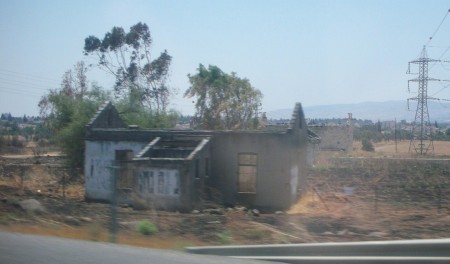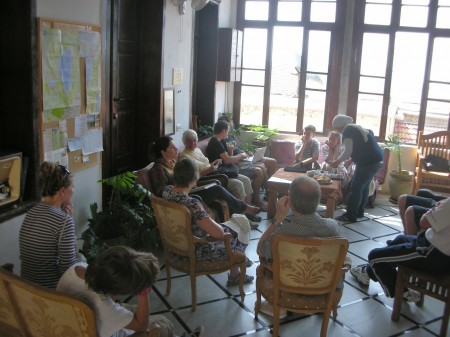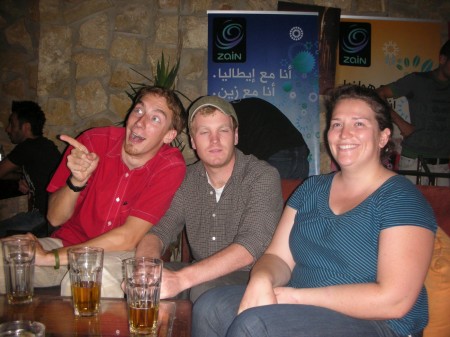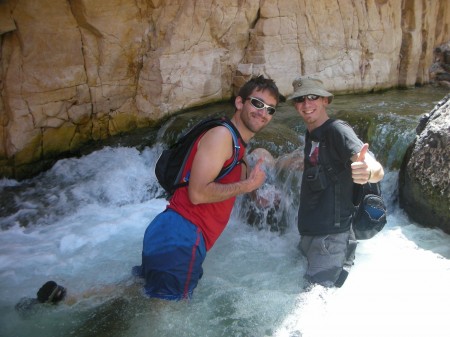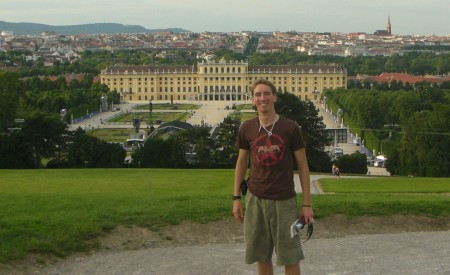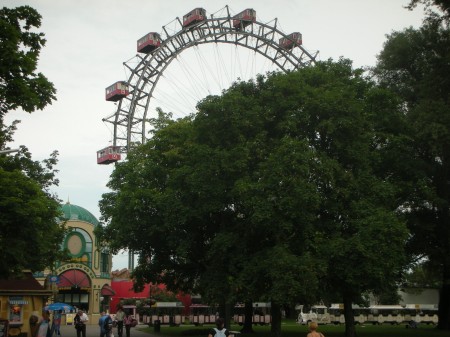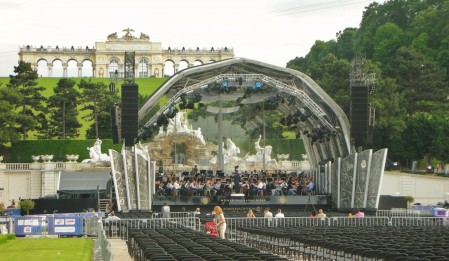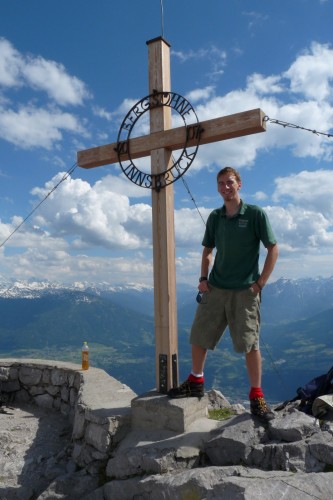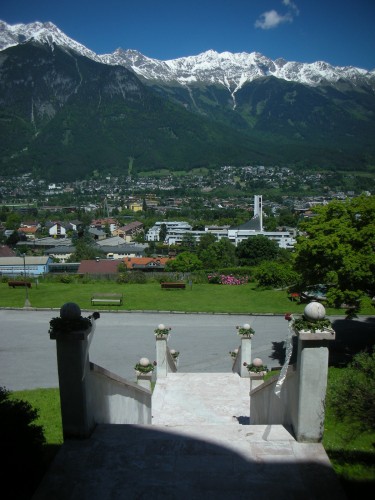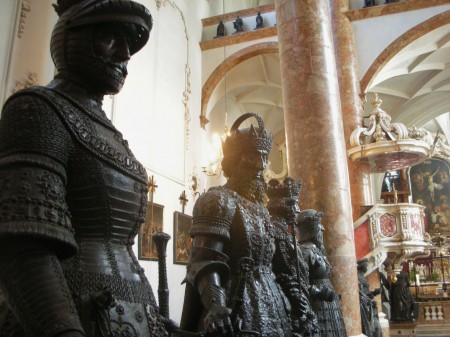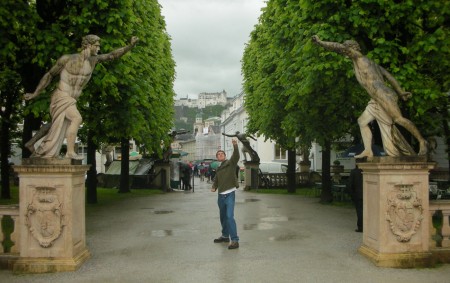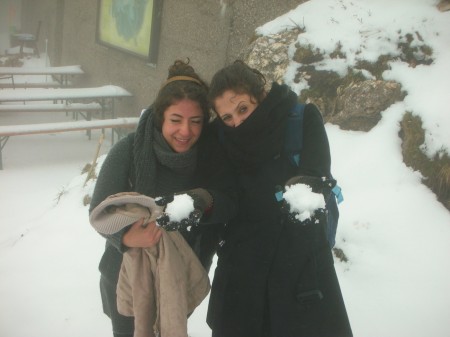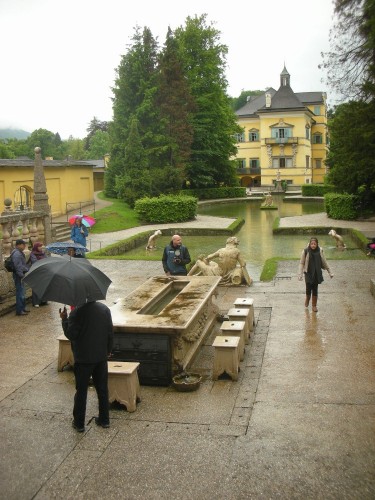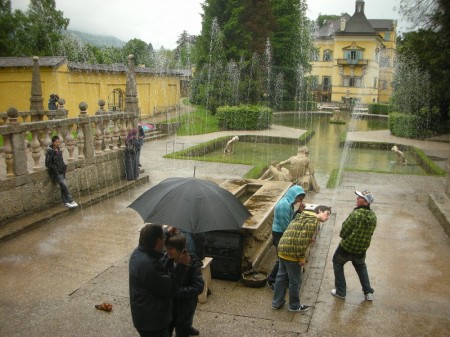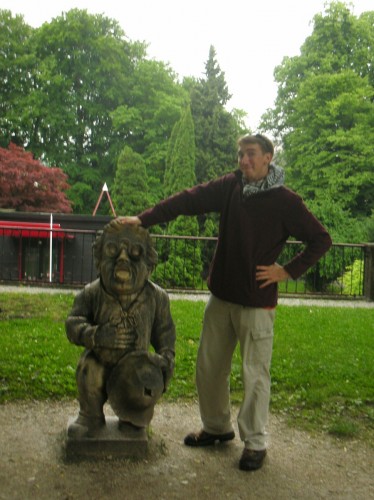In some cities, like in Cairo, I’ve felt that there are so many places to visit and document that there’s no possible amount of lifetimes that could be used. But this past weekend in Cairo, I decided to take a page out of Benjamin Orbach’s book, “Live from Jordan,” and make sure that I’m making use of my time in the Arab East to reconnect to the people and culture itself, instead of just the worn bricks and carvings that have often formed a basis of my travels. They’ve been around for hundreds if not thousands of years; I have time to see them. The days of my stay in the Arab world, however, are dwindling, slowly but surely.
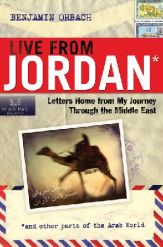 The book I’m describing was written in 2002 by an aspiring young American Jew, during the uncertain times between September 11th and the beginning of the Iraq war. My parents got it for me for Christmas, and I started reading it after finishing “Three Cups of Tea” while I was in Europe. I finished it while in Nazareth, and it definitely will be on my list of books to recommend for anyone who’s interested in viewing this most varied of Arab countries. Ben Orbach stayed for almost a year in Jordan, although it was cut short by the embassy’s request in March 2003 that all American civilians get the heck out of Dodge because of the start of the war. I got a chuckle out of every chapter in his book, mostly because I could nod my head and say, “brother I’ve been there and you’re preaching to the choir.” However, as Orbach was here in Jordan to study Arabic formally and on a research grant, the other half of his chapters, which are written in a format of letters back home to his family and friends, are packed with useful insights on culture, the separation I’ve oft-noticed between the “club life” of West Amman and the “sell you a chicken through your car window” of East Amman (it’s happened to me before). He has some especially good thoughts on the Palestine/Israel conflict, made all the more poignant because of his religion, upbringing, and family living in Israel. Lastly for me, it’s a jaw-dropping moment to realize that in the space of seven years since he wrote these letters home, prices for most common services and goods have doubled in price. Now that I’ve finished it, I’m going to be leaving my copy here in this apartment in Jordan, in the hopes that whatever foreigner (and Philip, God willing) that follows me will enjoy it just as much and for similar reasons. Here it is on Amazon.
The book I’m describing was written in 2002 by an aspiring young American Jew, during the uncertain times between September 11th and the beginning of the Iraq war. My parents got it for me for Christmas, and I started reading it after finishing “Three Cups of Tea” while I was in Europe. I finished it while in Nazareth, and it definitely will be on my list of books to recommend for anyone who’s interested in viewing this most varied of Arab countries. Ben Orbach stayed for almost a year in Jordan, although it was cut short by the embassy’s request in March 2003 that all American civilians get the heck out of Dodge because of the start of the war. I got a chuckle out of every chapter in his book, mostly because I could nod my head and say, “brother I’ve been there and you’re preaching to the choir.” However, as Orbach was here in Jordan to study Arabic formally and on a research grant, the other half of his chapters, which are written in a format of letters back home to his family and friends, are packed with useful insights on culture, the separation I’ve oft-noticed between the “club life” of West Amman and the “sell you a chicken through your car window” of East Amman (it’s happened to me before). He has some especially good thoughts on the Palestine/Israel conflict, made all the more poignant because of his religion, upbringing, and family living in Israel. Lastly for me, it’s a jaw-dropping moment to realize that in the space of seven years since he wrote these letters home, prices for most common services and goods have doubled in price. Now that I’ve finished it, I’m going to be leaving my copy here in this apartment in Jordan, in the hopes that whatever foreigner (and Philip, God willing) that follows me will enjoy it just as much and for similar reasons. Here it is on Amazon.
When I left on the “Trust Bus” early on Saturday morning, I paid 30 dinars for a one-way ticket to Nazareth, which seemed like a good deal to not have to deal with negotiating other transport once crossing over the Sheikh Hussein river border in the north. I was the only passenger on the bus for three hours; only me, the driver, and the luscious air conditioning. I didn’t know yet that Amman was about to be suffering the worst heat wave of the year at 41 degrees – but I’d be enjoying downright chilly climates at 38 degrees instead, ha ha! At the Jordan side of the border, the bus was loaded up with another dozen Arab travelers and I discovered that this wasn’t just a tourist transport, it was the actual ‘general transport’ bus for people waiting to cross the border.
With more people to entertain than a single drowsy foreigner, the driver switched on Arabic dance music and the mood turned downright festive. Teenage Arab girls in typical western capris and t-shirts splashed duty-free perfume on each other, and four plump middle-aged women in the full conservative black dresses and head scarves took turns yelling “Ohguhd. OHGUHD YALLA!!!” futilely at their hyperactive young children, trying to get to them to sit down. The Jordan River was much wider up here, closer to the Sea of Galilee that is its main source of water. When I saw it last year at the King Hussein border crossing, and at Jesus’ baptismal site even farther south, there was basically no water to speak of in the ditch that used to be a river.
Once over, our bus sat and idled in the shade for another 40 minutes before a bored-looking Israeli woman wandered over, shined under the bus for anything explosive with a long mirror, and waved us over before returning to stand in the shade. The customs and scanning procedure for me was the same as last time – I was immediately singled out for being the only Caucasian on the bus, brought to the head of the line, and then questioned as to my purpose in Israel, purpose in Jordan, what all these weird Central Asian visas in my passport were, and my father and grandfather’s name. I was tempted to add, “and my great-grandfather’s name was Ali bin Saddam bin Usama” but managed to restrain myself. The process took about fifteen minutes for me; longer than it had taken with my parents last time. I guess a single young male traveler coming through the “irregular” northern border was grounds for suspicion.
On the other side of the fence outside, I found the second transport system that the bus driver had arranged for me, an elderly Arab Christian man from Nazareth named Abu Hattem. He didn’t speak English, but was joined by his droop-mustached and dry-humored friend Riyath, a Muslim Nazarene. The former was generally quiet and easygoing, but Riyath introduced himself to me in English by saying, “You’re American? The Arabs in Israel don’t like Americans; you won’t find any that do. Not here or anywhere else. Not after what they’ve done.” I chose not to disagree with him from my own experience but explained my work in Jordan to him and Abu Hattem, who smiled encouragingly at me in the rear-view mirror. As we talked, Riyath seemed to warm to me and admitted that like most Arabs, it was our government that he disliked but he had no problem with Americans who wanted peace and justice for the Arab people.
When I asked the two of them what their religions were (not considered a rude question in the Arab world; I’m constantly asked it all the time), Abu Hattem quickly responded that he was a Christian, but Riyath seemed to take offense and instead told me to ask whether someone was Arab or Israeli and whether they wanted peace for all people or only for some. He seemed to get wistful for a moment, then as we pulled into Nazareth’s crowded city market, he looked back at me over the seat and said, “Zakariya, you must remember that for us, Israel is our father and Palestine is our mother. They are all we know and they are both in our blood now. This is not the West Bank or Gaza. I love both my father and my mother. What else can I do? But I wish that my father took better care of all his children.”
I was left standing there at the base of the famous Catholic basilica, not entirely sure where to go next. Thankfully, as I was wandering through the market, avoiding being sold anything (I only had my backpack with me; no room to really take anything back to Jordan), I overheard a family chatting nearby in Arabic that sounded touristic in nature. I asked them if they knew where the Fouzi Azar Inn was, and the adult woman in the group said to me in flawless English, “Where are you from? We’re from Canada, but Nazareth is my hometown. I’m Ieeyan.” She introduced her kids, niece and nephew to me and told me it was great to see another North American traveler visiting the less-traveled parts of Israel.
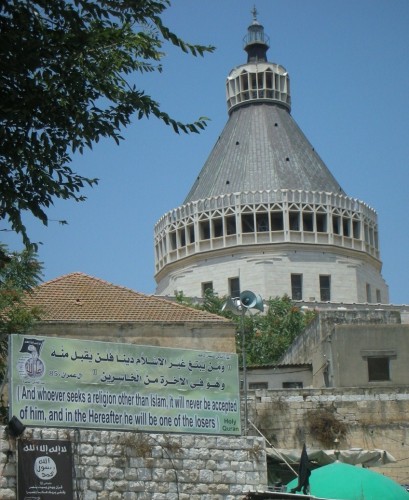
This is the first sign I saw after stepping off the bus near the towering basilica. From what I'm told, it used to be 70% Christian, 30% Muslim in Nazareth but now those numbers have been reversed and the Muslims are making a strong effort towards further conversions
With Ieeyan’s advice (and her Nazareth-smart knowledge that it was Azar with an aiyn letter, not an A-sounding letter) I was able to easily find the hostel, get checked in, and get a desperately needed shower. Interestingly enough, I ran into Ieeyan’s clan again just an hour later at the Orthodox Church of St Gabriel, just a few blocks away from the hostel, where they were debating sampling the holy water from the spring that by Orthodox legend, Mary was drawing water from when she first heard the angel speak to her to give her the Good News. Before the Orthodox bishop kicked us all out for Saturday mass, I had a chance to sample the water, collected for sampling purposes near the door. Lukewarm and not very appetizing for sure; I guess it’s the spiritual thought that counts.
As we exited the church, squeezing past a couple bearded and droning priests swinging incense, Ieeyan asked what I’d seen so far in the city, and recommended that I see the Salizian Hill on the western side of the city, to get a view out over the city. In fact, why don’t you just join us; my niece and nephew still live here in Nazareth and we’re taking their car up there now; we can fit you if we squeeze, she suggested. So, that’s how I ended up squeezing into the front of their tiny hatchback and being taken up the narrow streets of Nazareth in grand tourist style, up to the top of the hill, where we could see all the way across the valley into the nearby town of Natserat Illit, which was easy to pick out from the several skyscrapers and shining towers of glass. “That’s where all the Jews choose to live,” one of the kids said, gazing across the two-kilometer span between the hills to the other city. “The Arabs stay where they’ve always stayed in their old homes in Nazareth.” They explained to me that although it was an ironic coincidence, “Illit” is pronounced like “Elite” in English but in Hebrew merely means geographically higher, as opposed to higher status. I mused out loud whether it was intended to have the double meaning in English and Hebrew, and there was a wry chuckle of knowing agreement from the group.
As it was Saturday, the Jewish holy day, shops were closing up early and as the sun went down, there wasn’t too much available to do in the city. I went back to the hostel and napped in the dorm room bed I had acquired a few hours earlier, enjoying the cool stone around me. The Inn is named after its last male owner, Mister Fouzi Azar, who died in 1980. The Azar family used to be quite wealthy before 1948, when most of their vast land holdings in the area were liberated from Arab possession by the new Israeli government. Fouzi later could have gone to court over it to ask for recompense (it wasn’t offered up at the time) but ended up being too proud to accept any money for it and refused to say that he had “sold” his land to anyone. After his death the Azar house fell into disrepair for fifteen years, until an Israeli hiker, Maoz Inon, asked Fouzi’s five daughters and grandchildren for permission to turn it into a hostel, which they gave on the condition that it would bear their father’s name, because there had been no male heirs for the Azar name and it had died out with Fouzi. It was a neat story, related to me and some other spellbound tourists in the sunny main sitting room by Fouzi’s granddaughter, who now acts as the day manager for the hostel. Maoz Inon was also there too, and he and the Arabs chatted together in cheerful English about how things were going and doing some cleanup procedures together. If only the West – and Jordan! – could hear more about such amazing stories of benevolent cooperation between Israelis and Palestinians like this to create new businesses like this.
